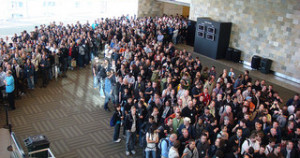Two weeks ago I published a post titled ‘Why Smart Software Teams Don’t Need Senior Developers, Tech Leads or Architects‘. I received a lot of good feedback, but I also know it was a long read. So, if you’re interested by the title but are looking for a quick brain dump rather than an enjoyable read, here’s the abridged version:
At Tyro Payments, we’ve doubled our Engineering team over the last year.
We don’t hire for, or use, titles like Graduate Developer, Junior Developer, Senior Developer, Tech Lead or Architect. Everyone has the title ‘Software Engineer’.
This is an important part of Tyro’s Engineering team culture. Here are the reasons… Continue reading


 a broad and powerful collections framework
a broad and powerful collections framework I think the term
I think the term  With that in mind, I present “Graham’s Guide to Learning Scala”. There are many, many resources on the web for learning about Scala. In fact, I think there’s probably too many! It would be quite easy to start in the wrong place and quickly get discouraged.
With that in mind, I present “Graham’s Guide to Learning Scala”. There are many, many resources on the web for learning about Scala. In fact, I think there’s probably too many! It would be quite easy to start in the wrong place and quickly get discouraged. Two weeks ago, I and a couple of other developers from Tyro went to the first
Two weeks ago, I and a couple of other developers from Tyro went to the first